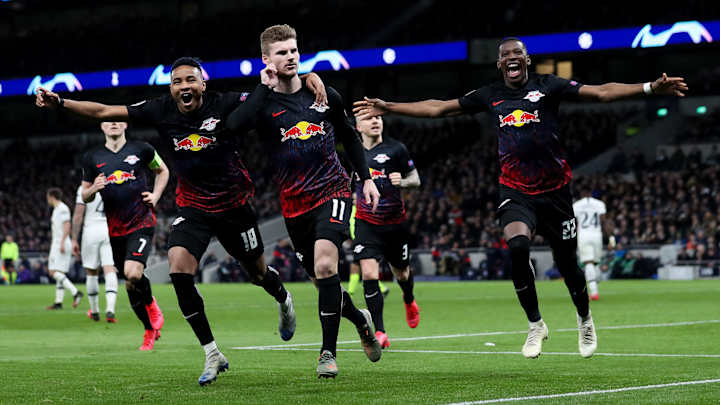The Implications of Timo Werner's Proposed Chelsea Transfer

The first major move of the upcoming transfer window is on the verge of becoming a formality, and it is one that looks likely to set the tone for the rest of the market. Timo Werner, having been strongly linked with Liverpool, now seems all but certain to join Chelsea from RB Leipzig after the Blues reportedly agreed to meet his buyout clause of roughly $62 million.
In terms of personnel, Liverpool is in a fortunate position. It has a powerful squad that is still relatively young (of the field players in the squad, only James Milner, Adam Lallana and Dejan Lovren are 30 or older) and, while it never serves to let a squad settle into stagnancy, Liverpool is in a position where it doesn’t have to go along with any deal with which it is uncomfortable.
The front trio of Mohamed Salah, Roberto Firmino and Sadio Mane is exceptional and works extremely well together, while there is backup from Divock Origi and Xherdan Shaqiri. Beyond that, highly promising 20-year-old Rhian Brewster is on loan at Swansea. There is no urgent need to bolster attacking options. There had perhaps been a thought that additional cover would be needed when Mane and Salah are away at the African Cup of Nations, scheduled to be staged in Cameroon in January-February 2021, but it seems increasingly unlikely that tournament will take place as planned.
Chelsea, by contrast, needs another forward, and it’s extremely useful that Werner is versatile enough to play wide or through the center. Olivier Giroud is 33 and has started only five league games this season. Although Frank Lampard seemed finally to have begun to trust him in mid-February, it’s been fairly clear for a while that Lampard does not see him as anything approaching a long-term option.
Both Pedro and Willian fall out of contract this year. Michy Batshuayi has another year left but has started only one league game this season and will probably leave in the summer. There is a clear need for forwards to supplement Tammy Abraham and Christian Pulisic, who are already at the club, and Hakim Ziyech, who will join at the end of the Premier League's prolonged and suspended season.
Werner, at 24, is the right age. His record–75 goals in 123 league appearances–since joining Leipzig four seasons ago is remarkable. His touch may not be quite as instinctive as that of many others, but he is a very modern center forward in that he has grown up in a pressing game and can operate anywhere across the front line. And he can finish.
He looks like the ideal center forward for the side Chelsea is looking to create–and he would also have been perfect for Liverpool, which is what makes it so striking that it has not followed up its interest. This, it seems, is the first solid indication of the impact the coronavirus crisis has had on top-level football. A total of $62 million does not seem like a lot for a forward of Werner’s class and potential–but it was too much for Liverpool, last season's Champions League winner and soon-to-be Premier League champion.
Every club in the Premier League is expected to see income reduced by around $180 million this season in rebates on broadcast rights, loss of matchday revenue and a declining advertising and sponsorship market. Liverpool initially placed its staff on furlough and all players took a pay cut.
Jurgen Klopp has made clear that, even if the club could afford a major transfer, he feels there is a moral case against making it.
“How do I discuss with the players about things like salary waivers and on the other hand buy a player for £50-60 million?” he said. “If you want to take it seriously and run a normal business, you depend on income. And we have no idea how much the club will earn—especially because we don’t know when we can start playing in front of spectators again.”
While that is a worthy and understandable stance, it is one Liverpool is in a position to take. Chelsea, which gave over club facilities to support the medical response to the pandemic, has little option but to buy, having operated under a transfer ban last season. What is telling, perhaps, is less that it is prepared to pay $62 million for a forward than that $62 million is all it will cost to land one of the brightest attacking prospects in Europe as he moves into the theoretical prime of his career. It's true that the figure is a product of his buyout clause, but in recent seasons, there would have been a queue of buying clubs ready to pounce. It is, after all, only a year since Atletico Madrid paid more than double that amount for Joao Felix, a player of enormous promise but far less proven quality.
Liverpool has not been a huge spender in recent years. The two big signings it has made, Virgil van Dijk and Alisson, were both largely funded by the sale of Philippe Coutinho–part of Barcelona’s panicked response to the sale of Neymar–but still, the fact that it saw a $62 million fee for a player it has tracked so closely as too much is striking.
It probably will take a while for prices to settle, but the early indications are that in the short term at least caution will reign.

An accomplished author of multiple books, Jonathan Wilson is one of the world’s preeminent minds on soccer tactics and history.